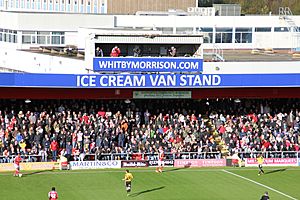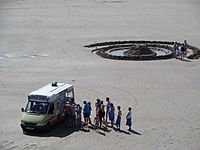Whitby Morrison facts for kids
| Limited company | |
| Industry | Automotive engineering |
| Founded | 1962 (as Bryan Whitby Engineering) |
| Headquarters | Crewe, Cheshire, United Kingdom |
| Products | ice cream vans |
|
Number of employees
|
c. 50 |
Whitby Morrison is a British company that makes ice cream vans. It's a family business located in Crewe, England. Many people say it's the best ice cream van maker in the world! The company is officially known as Whitby Specialist Vehicles Ltd.
Contents
How Whitby Morrison Started
Bryan Whitby, who was born in Cheshire, started his career learning how to build vehicle bodies. He worked for companies like J.H. Jennings and Rolls-Royce. In 1955, he joined S.C. Cummins, where he worked on ice cream vans.
The Big Idea: Direct Drive
Bryan Whitby and Sid Cummins worked together to create something special called the Direct Drive System. Bryan started his own company in 1962. In 1965, he got a patent for his new system. This system allowed the ice cream machines inside the van to be powered directly by the van's engine. Before this, vans needed a separate generator to make electricity for the ice cream machines. This new way was much more efficient!
Company Growth and Changes
Bryan Whitby Engineering Ltd officially became a company in 1973. Later, in 1989, it changed its name to Whitby Morrison. This happened after they took over another company called Electrofreeze. In 1998, they also bought the S.C. Cummins brand, which was the company Bryan used to work for.
In 2015, Whitby Morrison won a lawsuit against a company that had copied their ice cream van designs. This other company had made fake vans that looked just like Whitby Morrison's.
You might have even seen Whitby Morrison vans on TV! Two of their vans were on the BBC show Top Gear in 2020. In 2022, workers from Whitby Morrison appeared in an episode of the BBC show We Are England.
How the Company Works
The company's main workshop is in Crewe, England. It's located on the Crewe Gates Industrial Estate. About 50 people work there.
The Whitby Family Today
Stuart Whitby, Bryan's son, joined the company in 1978. He became a director in 1991 and is now the managing director. His son, Edward, is also involved and works as the operations director. So, it's still a family business!
Supporting Local Sports
The Whitby family has supported the local football team, Crewe Alexandra, since the 1950s. Since the 2012–13 football season, Whitby Morrison has sponsored a stand at the team's stadium, Gresty Road. It's even called The Ice Cream Van Stand! In 2021, the company agreed to sponsor the stand for another 99 years.
When Crewe Alexandra played in the 2024 EFL League Two play-off final at Wembley, Whitby Morrison gave away free 99 ice creams from one of their vans. In April 2025, Whitby Morrison was announced as the club's new shirt sponsor. The company also sponsors a stand at another nearby football club, Nantwich Town.
What Whitby Morrison Makes
Whitby Morrison takes regular vans and turns them into amazing ice cream vans. They sell their vans to over 60 countries around the world! They mostly use Mercedes-Benz Sprinter or Ford Transit vans, which are popular in the UK.
As the biggest ice cream van maker in the UK, they build about 100 vans each year. This includes 60 brand new vans, 30 vans that are converted from existing ones, and 10 vintage vans that get a new life.
Modern and Eco-Friendly Vans
All new vans are built on a Mercedes Sprinter chassis. These vans meet strict environmental rules for emissions, which means they are cleaner for the air.
Most of the vans Whitby Morrison builds have an electric motor-drive (EMD) system. This system lets ice cream sellers turn off their van engines when they are parked. They can then use electricity from the mains to power their freezers and other equipment. This saves fuel and reduces pollution. The EMD system can also be added to older vans.
The company has also been working on vans that run completely on electricity. These vans would have a special battery system to power the ice cream machines, so the engine wouldn't need to be on at all when parked. The first all-electric van was delivered in the summer of 2019.
See also
- Wales & Edwards
 | Calvin Brent |
 | Walter T. Bailey |
 | Martha Cassell Thompson |
 | Alberta Jeannette Cassell |



